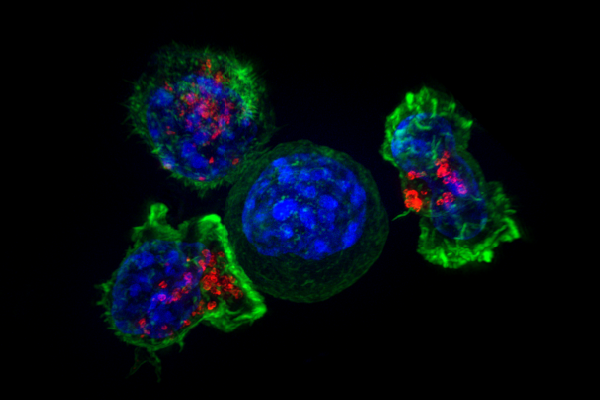Background
As the Omicron variant of COVID-19 becomes increasingly dominant among skyrocketing cases, including in vaccinated individuals, concerns of the variant’s immune escape abilities have grown.
Vaccines provoke important responses in the immune system to prevent disease, including creation of T cells and antibodies specific to the pathogen they introduce. In the case of mRNA vaccines for COVID-19, genetic code (mRNA) for the spike protein enters our cells, causing them to manufacture spike proteins. Our immune system then recognizes these proteins as foreign to our bodies, promptly destroying them while creating T cells and antibodies that can work against them in the future.
Antibodies and T cells play different roles in the event of an infection. Antibodies work by creating sites that bind to certain parts of a pathogen. As they pertain to mRNA COVID-19 vaccines, the antibodies will bind strongly to the spike protein. Since the spike protein is what enables SARS-CoV-2 to enter cells, binding antibodies to them will prevent infection.
On the other hand, T cells help fight infection by injecting poison into cells that are already infected, killing both the cell and the pathogen. mRNA vaccines help T cells recognize when a cell is infected with SARS-CoV-2. This means that antibodies are more useful for preventing infection via neutralization while T cells are better at stopping an infection that has already infected some cells.

Much of the focus surrounding COVID-19 vaccines and their efficacy has related to antibody quantity and binding affinity to the changed spike proteins of new variants in order to prevent infection instead of the role of T cells in managing infection. Researchers sought to quantify both antibody and T cell counts and efficacy in unvaccinated, twice vaccinated, and three-times vaccinated patients.
Results
A preprint study from Erasmus University Medical Center in the Netherlands detected high antibody levels against the original SARS-CoV-2 spike protein following receipt of the Pfizer or Moderna mRNA vaccines. Lower (but still significant) antibody levels were detected from the Johnson & Johnson viral vector vaccine. However, antibody levels from the mRNA vaccines decreased significantly within 6 months, while those from the viral vector vaccine did not. Though, even if neutralizing antibody levels remained high, researchers from Beijing’s Peking University found that Omicron escapes most SARS-CoV-2 neutralizing antibodies.
Studies from the Icahn School of Medicine at Mount Sinai in New York supported earlier reports that convalescent (unvaccinated, previously infected) and twice-vaccinated individuals had nonexistent protection against symptomatic infection from the Omicron variant. Boosted (three-times vaccinated) individuals had about 75% protection against symptomatic disease from Omicron, though it is unknown how long this protection will last.
Importantly, the Erasmus study found that unlike neutralizing antibodies, SARS-CoV-2-specific T cells were still detected in the blood 6 months after mRNA and viral vector vaccination as well as natural infection.
In contrast to findings that most neutralizing antibodies are largely ineffective against Omicron, data from Pfizer and BioNTech showed that 80% of spike-specific T cells in vaccinated individuals retained function. The Erasmus researchers corroborate this, finding that vaccinated individuals retain T cell immunity to the Omicron variant.
Discussion
Results from multiple studies now support a consensus that naturally infected and twice-vaccinated individuals have nonexistent protection against symptomatic infection due to depleted and ineffective neutralizing antibodies.
However, both populations can reattain significant protection against symptomatic infection by receiving initial vaccinations or a booster–though it is still unknown how long this protection will last.
These data indicate that convalescent individuals greatly benefit from vaccination, an observation that is of significant public health importance.
Carreño et al., 2021
Even though it has become significantly more difficult to prevent symptomatic infection due to the waning quantity and efficacy of neutralizing antibodies in convalescent and vaccinated individuals, T cells have been shown to remain active and are expected to still help prevent severe infection.
This is supported by new data that has shown that SARS-CoV-2-specific T cells remain present in the long-term and are still mostly effective against the Omicron variant in convalescent and vaccinated individuals.
Well-preserved T cell immunity to Omicron is likely to contribute to protection from severe COVID-19, supporting early clinical observations from South Africa.
Keeton et al., 2021
References
- BioNTech. “Update – Omicron Variant (B.1.1.529).” BioNTech Investors & Media, 8 Dec. 2021, https://investors.biontech.de/static-files/47b4131a-0545-4a0b-a353-49b3a1d01789.
- Cao, Yunlong, et al. “Omicron Escapes the Majority of Existing SARS-COV-2 Neutralizing Antibodies.” Nature, 23 Dec. 2021, https://doi.org/10.1038/d41586-021-03796-6.
- Carreño, Juan Manuel, et al. “Activity of Convalescent and Vaccine Serum against SARS-COV-2 Omicron.” Nature, 31 Dec. 2021, https://doi.org/10.1038/d41586-021-03846-z.
- Geurts van Kessel, Corine H., et al. “Divergent Sars Cov-2 Omicron-Specific T- and B-Cell Responses in COVID-19 Vaccine Recipients.” MedRxiv, 29 Dec. 2021, https://doi.org/10.1101/2021.12.27.21268416.
- Keeton, Roanne, et al. “SARS-COV-2 Spike T Cell Responses Induced upon Vaccination or Infection Remain Robust against Omicron.” MedRxiv, 28 Dec. 2021, https://doi.org/10.1101/2021.12.26.21268380.
- Sette, Alessandro, and Shane Crotty. “Adaptive Immunity to SARS-COV-2 and COVID-19.” Cell, 18 Feb. 2021, https://doi.org/10.1016/j.cell.2021.01.007.
- Wu, Katherine J. “T Cells Might Be Our Bodies’ Best Shot against Omicron.” The Atlantic, 14 Dec. 2021, https://www.theatlantic.com/science/archive/2021/12/t-cells-omicron-vaccine-immunity/620995/.
